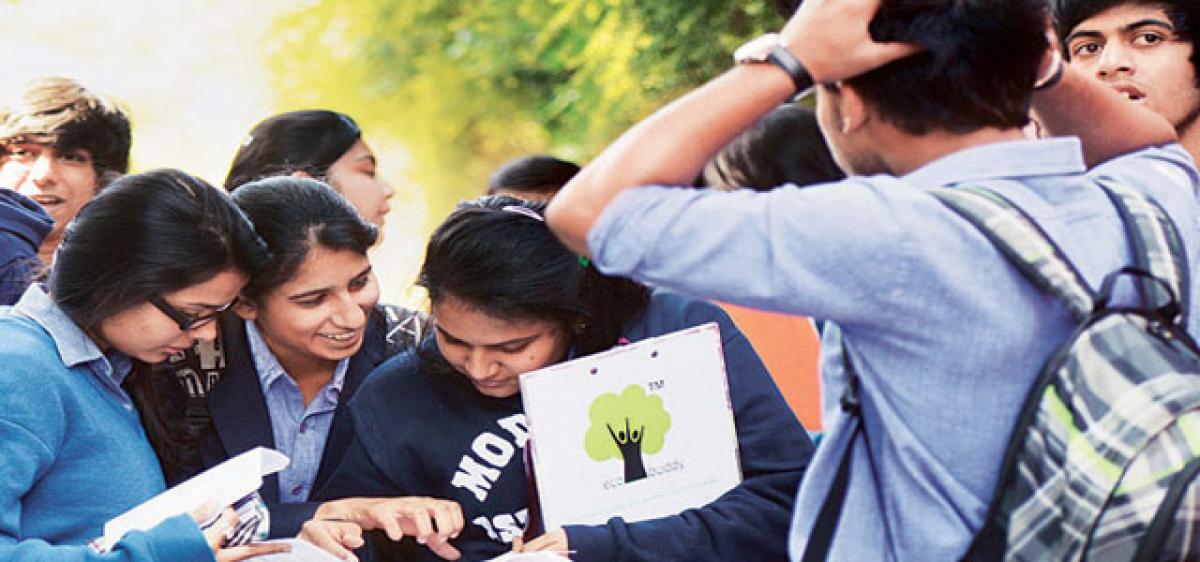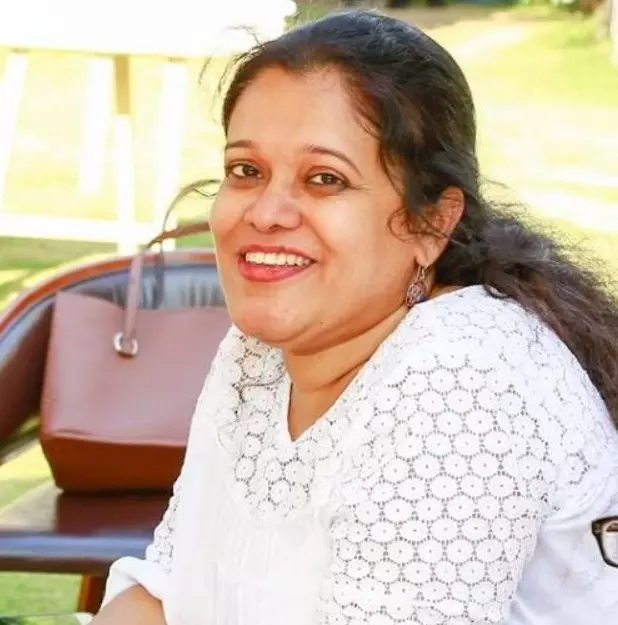Live
- Vizianagaram: ‘Looters, cheaters will be put behind bars’
- Jhansi says she will focus on holistic development of Vizag
- What Sam advocated
- Congress swings into damage control
- Pitroda's inheritance tax remarks fuel fresh attack
- Dharmavaram: A mastermind that played a spoilsport for TDP rivals
- KCR launches poll bus yatra
- Revanth dares KCR, Harish
- Modi frustrated, afraid of invisible voters: Kharge
- SC seeks clarification from EC on functioning of EVMs
Just In

It was in the 1980s, a science teacher was trying to teach 10th class children the process of reproduction in human beings; as the teacher was struggling to explain the concept, the kids began giggling, whispering and creating such ruckus that the teacher, who was struggling to keep a straight face, ordered quite a few of them to get out of the class in a bid to restore some semblance, and continu
Generations have changed but Indians have collectively failed the adolescents and teenagers in imparting sex education. Despite the many initiatives taken by the government and individual organisations, the extremely curious teenagers are left with limited resources to understand their body. In today’s time and age when there is too much information, but no way to check the right from the wrong, they are mostly confused or misinformed and that is proving fatal for their health—both mental and physical
It was in the 1980s, a science teacher was trying to teach 10th class children the process of reproduction in human beings; as the teacher was struggling to explain the concept, the kids began giggling, whispering and creating such ruckus that the teacher, who was struggling to keep a straight face, ordered quite a few of them to get out of the class in a bid to restore some semblance, and continued his rambling.
Fast forward to 2017, a male teacher, who received special training to impart adolescent (read sex) education to class 8 children, began his lecture in a bid to create awareness and also finish the mandatory training as was instructed by the NCERT, was quickly interrupted by one of the boys, who wanted to know how his first experience at intercourse was, leaving the teacher speechless.
Generations have changed but Indians have collectively failed the adolescents and teenagers. Despite the many initiatives taken by the government and individual organisations, the extremely curious teenagers are left with limited resources to understand their body, and in today’s time and age when there is too much information, but no way to check the right from the wrong; they are mostly confused or misinformed.
“Knowledge is wealth. And today most of the kids are having a lot of information courtesy the internet, but absolutely no knowledge. As per the NCERT directives sex education is a part of the curriculum, but not mandatory. We have been provided with books and a few teachers are also trained to educate the kids.
However, schools sometimes prefer to employ skilled counselors from external organisations, so that children are free to express their doubts and these counselors would know how to deal with the queries of children. We also talk to adolescent girls and explain to them about hygiene and health issues, so that they are more forthcoming to ask when they need something,” shared Regional Director, DAV Institutions, CBSE Board Seetha Kiran.
“Today’s generation is very different. They have access to a lot of information, and it is important that we start educating them from a very young age. Parents also need to get over their inhibitions and speak to the children. But, they should first know how to deal with children, and this is where the trained counselors can help.
Today, children up to class 5 are only told about things like difference between bad touch and good touch, and higher classes have their sex education which has been made mandatory. But I think that we must start educating kids as early as possible,” she adds.
A quick chat with child activist, and founder of Tharuni, an NGO that focuses on girl and women empowerment, Mamatha Raghuveer, who worked extensively on issues like exploitation, violence, child sexual abuse and child marriages, provided further proof to the inadequacy of state machinery to deal with teen sexual health and education issues.
It has been the National Rural Health Mission’s directive since 10 years that there must be adolescent health clinics attached to all hospitals. Recently one such centre ‘YUVA’ has been launched at Nilofer Hospital in Hyderabad. The real challenge is to get the teenagers to come to these clinics, “Girls in villages, especially, consider it a taboo to be seen at these clinics.
We must reach out to schools and colleges and explain to the kids that there is a facility that they can reach out to and call if they need help. Ignorance about sexual health is leading to many problems. According to the recent survey, Telangana is high on STD and infections and teenagers are majorly affected by this.
Teenage abortions, too, are at an all time high, and it is not just in villages. Many pharmacists selling over the counter pills and clinics are thriving on teenage pregnancies in Hyderabad. In most of these cases, the girls are ill-informed to deal and take advice from others. Recently, there was a tragic incident of a young educated girl, who was working in a shop, and got pregnant.
Her parents are daily wage workers, and she did not know whom to approach. Finally she went to a clinic in her fourth month, and insisted on abortion. Unfortunately she died during transfusion of blood. The parents did not know who was responsible for pregnancy, no one could do anything,” she relates.
Another major issue that needs deliberation is that sex education in India is limited to good touch, bad touch, and menstrual health and hygiene for girls and there is absolutely little or no information imparted formally to the youngsters on issues like having safe sex and protection.
“In the US, children of around 10 years are given knowledge about these issues, and it is accepted that they start dating as early as 13. In India, we refuse to accept that we are dealing with a different generation. As elders, we are not realising the fact that children need to know. Topics like condoms, female condoms are not discussed with them. There have been discussions happening to this effect. But, I do not see much happening in that direction,” Dr Mamatha explains.
Yet another major gap one sees in teenage health care initiatives is that there is absolutely no support or advice that is available to teenage boys. While there are a few agencies engaged in speaking to girls, (even though the counselling is never on protecting oneself) the boys are at best ignored totally, and they resort to their own methods of learning, which can be dangerous to say the least.
Further, there is no way the youngsters can get easy access to protection. Buying condoms is absolutely unthinkable in India, whereas in the west, there are vending machines for the same. Dr Mamatha agrees, “Nothing is happening to educate boys. In the first place, it is difficult to mobilise them.
They would like to explore on their own. And often, this leads to bad experiences, some of which may last for life.” “We must probably have a portal that gives proper and extensive information to teenagers or a helpline that they can reach. And since youngsters all over are into mobile phones, there should be reliable information available to them through a Mobile app,” she adds.
And as far as condom vending machines are concerned, it is a farfetched probability, she opines.
Dr. Sameer Khan, Chief of Business at CallHealth agrees to the view, “While school curriculums are modernising their ways, with NCERT’s latest curriculum incorporating Sex Education; the scope remains limited to ‘good touch’ ‘bad touch’.
Also, there has been very limited noise in the media regarding the issue and importance of sex education and protecting teenagers’ sexual health. I believe that it affects the mind, body, health and society alike. While schools are broadening their ways of helping children to learn about these essentials, parents are still miles behind.”
The online integrated healthcare service provider ‘CallHealth’ is, in fact, planning to contribute to filling the gap that exists in teenage health care sphere. “The advent of technology can be used for a greater cause. CallHealth has tied with institutions such as schools and colleges to connect with teenagers, parents and the educators in discussing the wellness of teens and understand their disposition about mind, body and health during the child’s growing years.
CallHealth, as per the plan, will begin with helping kids to feel comfortable and confident in their skin and body, instill respect for the opposite gender, on the same. There is low awareness about the fact that the mind and body have a massive connect. The idea is to create a healthy link between the two for each child and bring confidence in parents and educators about it as well,” shares Dr Sameer Khan.
“We are also building awareness campaigns, using the best that technology has to offer, along with building offline campaigns. We are confident that our integrated services, coupled with the advantage of anonymity, we will be able to drive teenagers to proactively reach out to us and we can, in turn, help them connect with the right people at the right time,” he adds.
There are many surveys and statistics that indicate the adverse situation, but it is just the tip of the iceberg. There is an urgent need to address the issues plaguing teenage sexual health in India. The onus of this definitely lies with the government, schools and colleges, health providers, NGOs working in the sector, who need to evolve with the changing times, and the demands that it brings - and more so, on each individual, who is a parent. May be it’s time parents are given counseling on dealing with children in the right spirit, keeping aside the prejudices and taboos.

© 2024 Hyderabad Media House Limited/The Hans India. All rights reserved. Powered by hocalwire.com







